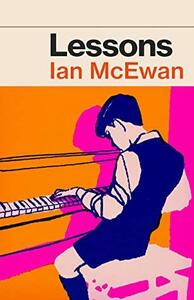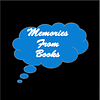Take a photo of a barcode or cover
Ian McEwan has long been on my to read list. Lessons is the first of his books I am reading. Certain books leave a feeling that perhaps the reader is not "clever" enough to follow or understand the depths the author is trying to reach. To me, that is not a fault of the book but an indication that I am not the reader for the book. Perhaps, I will try a different book by the author. Perhaps not. This one was not for me.
Read my complete review at http://www.memoriesfrombooks.com/2024/06/lessons.html
Reviewed for NetGalley.
Read my complete review at http://www.memoriesfrombooks.com/2024/06/lessons.html
Reviewed for NetGalley.
emotional
slow-paced
Plot or Character Driven:
Character
Strong character development:
Yes
Loveable characters:
Complicated
Diverse cast of characters:
No
Flaws of characters a main focus:
Yes
Great book
Took a while to get into it, but glad I stuck with it
Took a while to get into it, but glad I stuck with it
An epic of twentieth-century life, and one particular twentieth-century life, Lessons is both personal and historical, rich in detail and sprawling in scope. Its intricacy and endurance is a powerful literary achievement.
The story opens on Londoner Roland Baines in his late thirties, newly abandoned by his wife and charged with caring for his infant son in the aftermath of the Chernobyl meltdown. It moves backward to Roland's adolescence at a British boarding school and his life-altering encounter with a charismatic and controlling piano teacher during the Cuban Missile Crisis. Then forward, through Roland's middle years: the aftermath of his wife's departure, the fall of the Berlin Wall. The cast of characters grows to include Roland's friends, lovers, descendants, and even enemies, each individual standing for some element of our evolving twentieth- to twenty-first-century society.
Lessons ranges freely over the course of Roland's life as well as and the lives of his and his wife's parents, exploring nearly one hundred years of political and personal history. It is fascinated with the way world events, even seemingly distant ones, shape individual human lives. Readers with strong historical backgrounds or personal memories of the 1960s-1980s, the epoch most strongly weighted in the book, will probably find the political aspects compelling. But, remembering these events only dimly from history books, I found it hard to become emotionally invested.
Emotional investment is also lacking among the characters. Roland is the main character, but lengthy passages are devoted to his errant wife, his parents, and his mother-in-law - and all with the same steady, precise prose, the same omniscient but distant narrative voice. This voice feels like Roland's voice: intelligent, wry, but also eternally disappointed, and this was a frustration to me. Roland is a depressive character, and his point of view is often depressing. The story, despite surveying Roland's life from childhood to old age, skips over nearly all the happy parts, giving the impression of an existence consisting mostly of failure and disappointment, and a history consisting primarily of war and death.
But Roland's story ends on a positive note, and I want to end this review on one as well. Despite its somber tone, Lessons was a pleasure to read. In the comparison between a big life - one lived for politics and art and fame - and a small one, lived for love and friendship and family, the small life - the life Roland has reluctantly accepted as his lot - wins out.
[I received a complimentary ARC from NetGalley and the publishers. Opinions are my own.]
The story opens on Londoner Roland Baines in his late thirties, newly abandoned by his wife and charged with caring for his infant son in the aftermath of the Chernobyl meltdown. It moves backward to Roland's adolescence at a British boarding school and his life-altering encounter with a charismatic and controlling piano teacher during the Cuban Missile Crisis. Then forward, through Roland's middle years: the aftermath of his wife's departure, the fall of the Berlin Wall. The cast of characters grows to include Roland's friends, lovers, descendants, and even enemies, each individual standing for some element of our evolving twentieth- to twenty-first-century society.
Lessons ranges freely over the course of Roland's life as well as and the lives of his and his wife's parents, exploring nearly one hundred years of political and personal history. It is fascinated with the way world events, even seemingly distant ones, shape individual human lives. Readers with strong historical backgrounds or personal memories of the 1960s-1980s, the epoch most strongly weighted in the book, will probably find the political aspects compelling. But, remembering these events only dimly from history books, I found it hard to become emotionally invested.
Emotional investment is also lacking among the characters. Roland is the main character, but lengthy passages are devoted to his errant wife, his parents, and his mother-in-law - and all with the same steady, precise prose, the same omniscient but distant narrative voice. This voice feels like Roland's voice: intelligent, wry, but also eternally disappointed, and this was a frustration to me. Roland is a depressive character, and his point of view is often depressing. The story, despite surveying Roland's life from childhood to old age, skips over nearly all the happy parts, giving the impression of an existence consisting mostly of failure and disappointment, and a history consisting primarily of war and death.
But Roland's story ends on a positive note, and I want to end this review on one as well. Despite its somber tone, Lessons was a pleasure to read. In the comparison between a big life - one lived for politics and art and fame - and a small one, lived for love and friendship and family, the small life - the life Roland has reluctantly accepted as his lot - wins out.
[I received a complimentary ARC from NetGalley and the publishers. Opinions are my own.]
emotional
hopeful
reflective
medium-paced
Plot or Character Driven:
Character
Strong character development:
Yes
Loveable characters:
No
Diverse cast of characters:
No
Flaws of characters a main focus:
No
adventurous
emotional
inspiring
mysterious
medium-paced
Plot or Character Driven:
Character
Strong character development:
Yes
Loveable characters:
Complicated
Blog:
https://clife.blog/2022/08/03/book-review-lessons-by-ian-mcewan/
This novel is indeed about Lessons.
Roland cannot get over his wife abandoning him and their baby. Why have one if you aren’t going to look after it or want it? Shouldn’t have a baby because you think you are supposed to or to fall in a clique.
Roland goes back and forth in life in his thoughts. One second he’s 14 playing the piano with his creepy teacher and the next he is in the daily life of the current.
His journey through his life is punctuated with attempts at escape, but ultimately always reflecting on how one’s personal reactions to events affects all around us. Are our personal feelings of rejection, remorse, anger, sadness, elation ever truly our OWN? How do we navigate our own private emotions without those emotions effecting those around us?
It was more so a life lesson and how our thoughts can go back and forth. However for a novel I wish it was more consistent.
Thanks to the publishers for sending me this novel in exchange for my honest review.
Didn't really grip me and I was not in the mood. And then I didn't pick it up again
If I could give it 4.5 I would. Slow to start, it snowballs into an enchanting, relatable story of love, loss, humanity, and what could have been.
dark
emotional
medium-paced
I liked this one, but didn't love it. I got into a bit of a reading slump during it, so I think that's partially to blame for my review and not the actual contents of the book. It did seem a little all over the place at the times, but definitely an interesting story, and McEwan is obviously a great writer.

